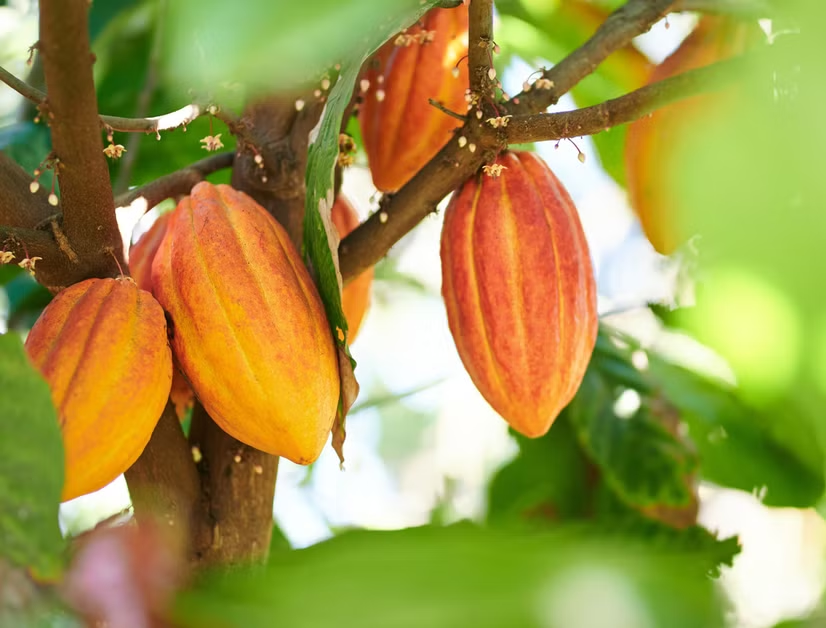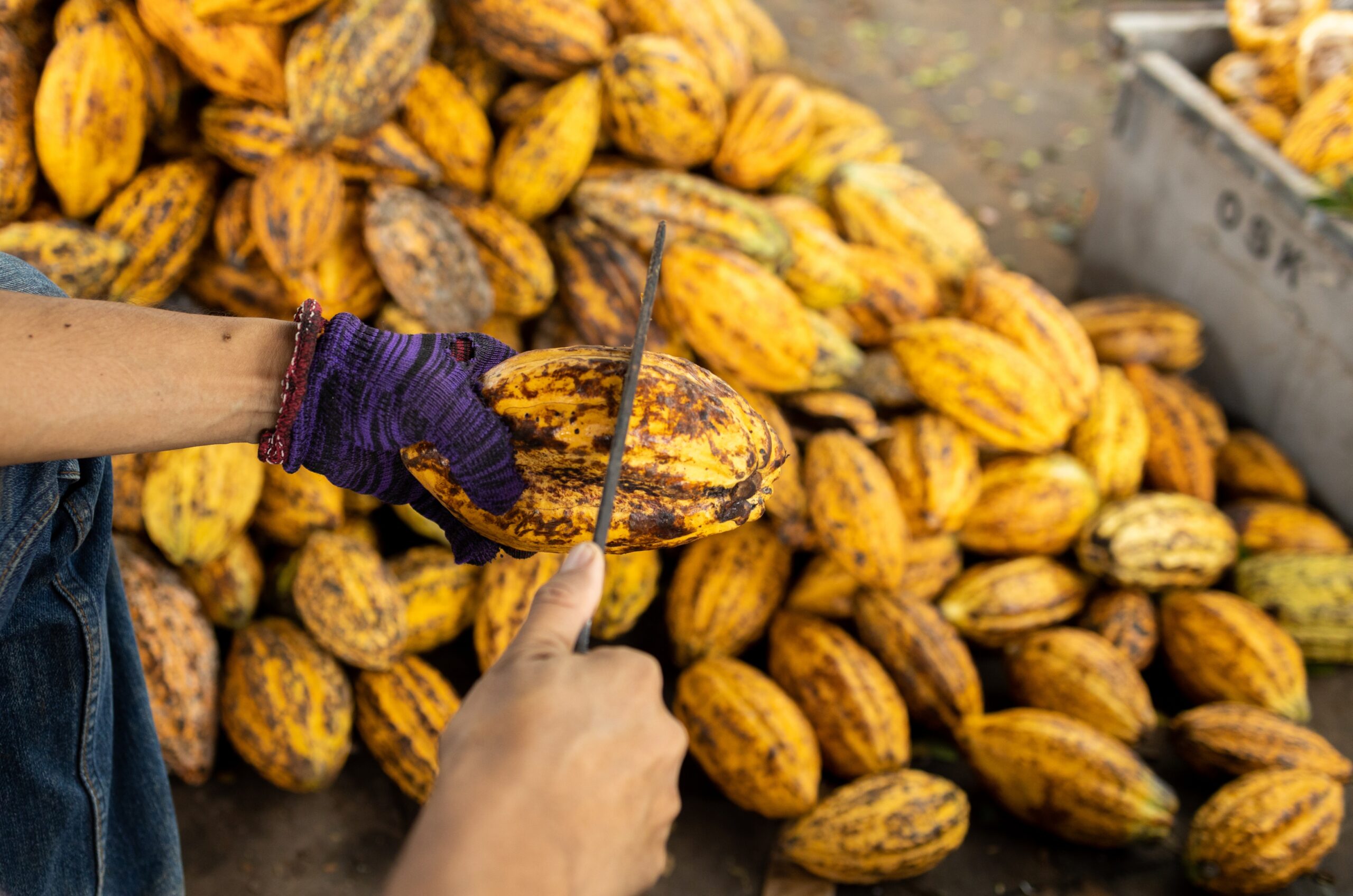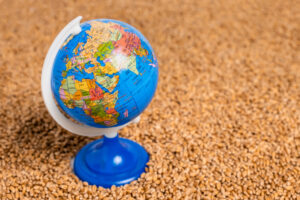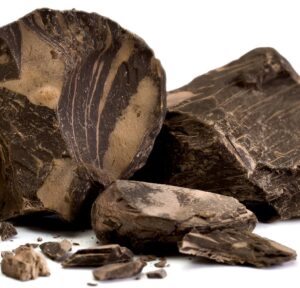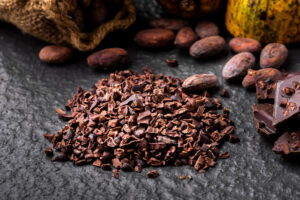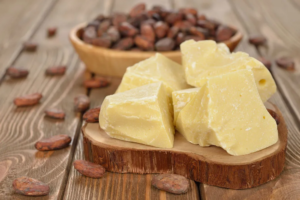When it comes to cocoa beans exports, Africa is the powerhouse. In 2023, total global cocoa production amounted to around 5.6 million tonnes, with Côte d’Ivoire alone accounting for about 42%, and Ghana adding roughly 12% — together making up more than half of global output. West and Central Africa remain essential to the African cocoa beans market, and the world’s chocolate supply depends heavily on stability in these regions.
Yet production is facing growing challenges. Ghana’s cocoa output for the 2023/24 season dropped by nearly 40%, falling to about 500,000 tonnes — its lowest in decades — due to poor weather, disease, smuggling, and illegal gold mining.(Reuters, African Agribusiness) At the same time, global cocoa prices have soared: by early 2025, prices surged to over $10,000 per metric ton, more than 150% higher than a year earlier.
Despite these setbacks, Ghana remains a major player. Its annual production reaches between 850,000 and 1 million tonnes, and cocoa still contributes about 30% of Ghana’s foreign exchange earnings and 8-6% of GDP. Over 800,000 smallholder farmers depend on cocoa for their livelihood, making the crop economically vital.
Given these dynamics, many buyers are still seeking secure partnerships with trusted African cocoa beans suppliers who can guarantee both quality and reliability.
Why Africa Dominates the Cocoa Industry
When you think of chocolate, your mind probably jumps to Europe’s famous brands — but the truth is, the real magic starts in Africa. The continent is the heartbeat of the global cocoa supply. In fact, Africa produces over 70% of the world’s cocoa beans, with West Africa alone accounting for around 60%. Countries like Côte d’Ivoire, Ghana, Nigeria, and Cameroon are the main players, but other African nations are steadily increasing their output, making the African cocoa beans market a powerful force in the global cocoa trade.
What makes African cocoa beans so sought after? Two words: quality and flavor. The tropical climate, fertile soils, and traditional farming methods create cocoa beans with rich flavor profiles — something chocolatiers and food manufacturers can’t get enough of. Whether it’s organic cocoa beans grown without chemicals or premium cocoa beans that meet strict international standards, African farmers have mastered the art of producing beans that deliver both taste and quality.
The African cocoa market isn’t just about supplying beans; it’s also a major driver of livelihoods. Millions of farmers depend on cocoa farming, with Côte d’Ivoire and Ghana together employing over 2 million smallholder farmers. The market is not just big in numbers — it’s deeply human, tied to the stories and hard work of farming communities who nurture the crop from seed to harvest.
For businesses looking to buy cocoa beans, Africa remains the go-to source — not just because of the volume it produces, but because of the reputation it has built over decades. The global demand for chocolate and cocoa-based products is on the rise, with the cocoa market projected to surpass $15 billion by 2027. This means African cocoa beans exports will only grow in significance, making reliable African cocoa beans suppliers, like Radad, more important than ever in ensuring consistent quality and bulk availability.
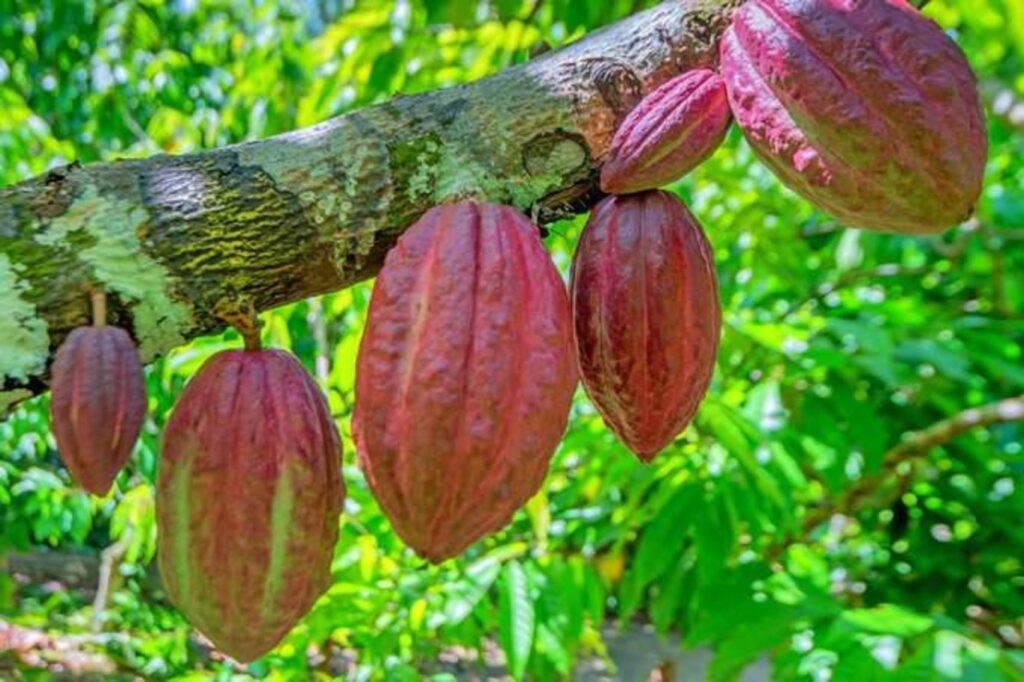
Who Supplies Africa’s Cocoa — Origins, Quality & Certifications
Africa’s cocoa supply chain is built on the backbone of smallholder farmers and organized exporters who ensure the beans meet global standards. The origins of Africa cocoa beans are as diverse as the continent itself, but the bulk comes from West African countries like Côte d’Ivoire, Ghana, Nigeria, and Cameroon. Côte d’Ivoire alone produces about 2.2 million metric tons annually, making it the world’s top cocoa beans exporter, while Ghana contributes around 800,000 metric tons, renowned for its distinct flavor and high butter content.
The quality of African cocoa beans is unmatched, thanks to the combination of ideal climatic conditions, rich soils, and traditional cultivation techniques passed down through generations. Many African cocoa farms produce premium cocoa beans, which are graded according to size, moisture content, and fermentation quality. Proper fermentation and drying are critical — they unlock the flavor potential that makes African cocoa so prized in the chocolate industry.
In recent years, there’s been a growing shift toward organic cocoa beans production in Africa. Farmers adopting organic practices avoid synthetic fertilizers and pesticides, ensuring their crops meet the increasing demand for sustainable, chemical-free cocoa. Organic certification, along with Fairtrade and Rainforest Alliance certifications, has become more common among trusted African cocoa beans suppliers. These certifications assure buyers that the cocoa beans are ethically sourced, environmentally friendly, and traceable back to their origin.
For bulk cocoa buyers, working with reliable African cocoa beans suppliers, such as Radad International, ensures access to beans that meet international quality and certification requirements. Exporters like Radad not only source from top-producing regions but also maintain strict quality control measures, ensuring every shipment — whether it’s bulk cocoa beans or smaller consignments — arrives ready for processing into world-class chocolate and confectionery products.
The Growing Global Demand for African Cocoa Beans
The global appetite for chocolate and cocoa-based products keeps climbing, and African cocoa beans are at the heart of this demand. According to the International Cocoa Organization (ICCO), the global cocoa market was valued at over $14 billion in 2024 and is projected to grow steadily, fueled by increasing chocolate consumption in both traditional markets like Europe and emerging ones such as Asia and the Middle East.
Africa cocoa beans exports account for nearly 70% of the world’s supply, making the continent the most influential player in shaping cocoa market prices and availability. The African cocoa market is not just large — it’s diverse. Premium cocoa beans from Ghana and Côte d’Ivoire command higher prices in global markets due to their consistent quality, while Nigeria’s and Cameroon’s cocoa beans are appreciated for their versatility in both mass-market and artisanal chocolate production.
Demand isn’t only about volume — it’s also about quality and ethics. Global consumers are becoming more conscious about where their cocoa comes from, which is why certified organic cocoa beans and ethically sourced bulk cocoa beans are now in higher demand than ever. Buyers want assurance that their cocoa is traceable, grown without harmful chemicals, and sourced in ways that benefit local farming communities.
For businesses looking to buy cocoa beans in bulk, African cocoa beans suppliers like Radad provide a strategic advantage. Radad ensures steady supply, premium quality, and adherence to international certifications, making them a trusted choice for confectionery manufacturers, chocolatiers, and bulk cocoa beans exporters.
With this upward trend, experts believe that the next decade will see Africa not just as a raw material supplier but as a central force in the global cocoa value chain, with more investment in processing, sustainability, and premium product offerings.
Why African Cocoa Beans are Considered Premium in the Chocolate Industry
African cocoa beans have a special place in the global chocolate industry, and it’s not just because of the volume Africa produces — it’s about the quality, flavor profile, and heritage behind each bean.
Cocoa from West Africa, especially Ghana and Côte d’Ivoire, is known for its rich, full-bodied flavor with balanced bitterness and deep chocolate notes. These are the qualities chocolate manufacturers crave when creating premium and luxury chocolate products. Nigerian cocoa beans, for instance, are celebrated for their high butter content, which makes them ideal for smooth, creamy chocolate and confectionery products.
But flavor alone doesn’t make cocoa beans “premium.” There’s also the matter of post-harvest processing — the fermentation and drying techniques that farmers use directly affect the quality of the cocoa. African farmers have generations of experience perfecting these methods, which is why the African cocoa market produces beans that consistently meet international standards.
Another factor boosting Africa’s cocoa reputation is traceability and certification. Increasingly, premium cocoa beans come with certifications such as:
- Organic Certification – ensuring the beans are grown without synthetic pesticides or fertilizers.
- Fairtrade Certification – guaranteeing that farmers are paid fairly and that sustainable farming practices are upheld.
- Rainforest Alliance Certification – confirming that production supports environmental protection and biodiversity.
This is where bulk cocoa beans exporters like Radad International stand out — by offering Africa cocoa beans exports that meet these certifications, ensuring buyers not only get top-quality beans but also align with global sustainability goals.
For international buyers and chocolatiers, this combination of exceptional flavor, ethical sourcing, and strict quality control makes African cocoa beans one of the most sought-after in the world.
The Economic Impact of Cocoa Beans Exports on Africa
Cocoa is more than just an agricultural product in Africa — it’s the lifeblood of millions of households and a major contributor to the continent’s economy. Across West Africa, where over 70% of the world’s cocoa is grown, the industry directly supports over 5 million smallholder farmers and indirectly sustains millions more through jobs in processing, logistics, and trade.
For countries like Côte d’Ivoire and Ghana, cocoa is the single largest agricultural export, accounting for a significant share of national GDP. In Ghana alone, cocoa contributes roughly $2 billion annually to the economy, while in Côte d’Ivoire, cocoa exports generate over 40% of the country’s export revenue. Nigeria, Cameroon, and other producers also rely heavily on the sector for foreign exchange earnings.
The economic benefits extend beyond just foreign exchange. Cocoa drives rural development by funding community infrastructure, schools, and healthcare through government export levies and public–private partnerships. In many farming communities, the cocoa harvest season represents the peak income period of the year, with farmers investing their earnings in education, better housing, and farm improvements.
However, the cocoa economy also faces challenges. Price fluctuations in the global market, climate change, and aging farms can affect farmer incomes and production stability. That’s why initiatives like sustainable farming programs, improved processing facilities, and value addition within Africa are becoming essential. By moving up the value chain — for example, producing semi-finished products like cocoa butter and cocoa powder — African nations can capture a greater share of the chocolate industry’s profits.
For buyers, understanding this economic significance is more than just a statistic — it’s a chance to partner in a supply chain that empowers communities, strengthens economies, and sustains a heritage crop that has been part of Africa’s story for over a century.
The Challenges and Opportunities in Africa’s Cocoa Export Market
Africa’s cocoa export market stands at a critical crossroads — full of opportunities, yet not without significant challenges. On one hand, global demand for cocoa is growing steadily, fueled by the rising consumption of chocolate and cocoa-based products in emerging markets like China, India, and the Middle East, alongside traditional markets in Europe and North America. According to the International Cocoa Organization (ICCO), global cocoa demand is projected to grow by about 3% annually over the next decade. This offers African producers a chance to expand their market share and diversify their buyers.
However, the industry must navigate a series of pressing challenges:
- Price Volatility – Cocoa prices are subject to global market swings, often leaving farmers vulnerable. A sudden drop in prices can significantly reduce incomes for millions of African farming families.
- Climate Change – Shifting weather patterns, rising temperatures, and unpredictable rainfall threaten cocoa yields, especially in West Africa’s cocoa belt.
- Aging Farms & Farmer Demographics – Many cocoa farms are decades old, with reduced productivity, and younger generations are less inclined to take up farming due to limited profitability.
- Sustainability & Ethical Sourcing Pressure – Global buyers and consumers are increasingly demanding ethically sourced cocoa that meets strict environmental and social standards. This means African producers must adapt to certifications like Fairtrade, Rainforest Alliance, and UTZ, which require significant investment in training and compliance.
Opportunities for Growth and Transformation
Despite these hurdles, Africa’s cocoa sector has enormous potential. Countries are beginning to focus on:
- Value Addition – Instead of exporting only raw beans, nations are investing in local processing facilities to produce cocoa butter, powder, and even chocolate for export. This can triple the export value compared to raw bean sales.
- Sustainability Programs – Public–private partnerships are training farmers in climate-smart agriculture, improving yields while protecting forests.
- Market Diversification – Expanding into non-traditional markets and developing regional trade agreements within Africa (e.g., AfCFTA) can reduce dependency on European markets.
- Digital Agriculture & Traceability – Using technology to trace cocoa from farm to factory enhances transparency, meets buyer requirements, and strengthens brand trust.
The next decade will determine whether Africa remains primarily a raw cocoa supplier or evolves into a global hub for premium, processed cocoa products. By tackling challenges head-on and leveraging opportunities, African cocoa exporters can secure a more profitable and sustainable future for millions of farmers and the economies they support.
How to Source African Cocoa Beans from Trusted Suppliers
For businesses, chocolatiers, and manufacturers looking to tap into Africa’s rich cocoa heritage, finding the right supplier is the most important step. Quality, consistency, and trust are non-negotiable in the global cocoa trade, and sourcing from the right partner can make the difference between a successful long-term operation and costly setbacks.
- Understand the Origins Africa produces over 70% of the world’s cocoa, with West African nations like Côte d’Ivoire, Ghana, Nigeria, and Cameroon leading the charge. Each origin has distinct flavor profiles — Ghanaian cocoa is renowned for its rich, robust flavor, while Nigerian cocoa offers a deep, earthy profile ideal for certain blends. A good supplier will know how to source from the right regions based on your product needs.
- Look for Proven Quality Assurance Trusted suppliers operate with rigorous quality control, from farm-level selection to final export packaging. Certifications such as Fairtrade, Rainforest Alliance, or Organic can indicate adherence to global standards, but a supplier’s internal processes — such as bean grading, fermentation consistency, and moisture control — matter just as much.
- Prioritize Traceability and Ethical Sourcing Global buyers increasingly demand to know where and how their cocoa was produced. This means partnering with suppliers who can guarantee traceability from farm to shipment, ensuring ethical labor practices and sustainable farming methods.
- Work with Established Exporters The safest route to quality African cocoa is through established exporters with a strong presence both in Africa and globally. For example, companies like Radad International, with offices in Nigeria and Dubai, specialize in sourcing premium-grade cocoa beans, nibs, and powder directly from trusted farms. Their dual presence allows them to maintain close relationships with African producers while efficiently serving international buyers.
- Build Long-Term Partnerships Cocoa sourcing works best as a relationship-driven business. Long-term contracts with reliable exporters not only secure consistent supply but can also help you access better pricing and first pick of top-quality harvests.
Whether you’re a small-batch artisan or a large-scale manufacturer, sourcing African cocoa beans from trusted suppliers ensures your products meet the highest standards — while supporting a more sustainable and transparent global cocoa trade.
Frequently Asked Questions (FAQs)
Which countries in Africa produce the best cocoa?
West African countries dominate global cocoa production, with Côte d’Ivoire, Ghana, Nigeria, and Cameroon being the top producers. Each has its own unique flavor profile — Ghanaian cocoa is known for its rich, full-bodied taste, while Nigerian cocoa offers an earthy, deep aroma favored in premium blends.
How can I ensure I’m buying high-quality African cocoa beans?
Quality starts with proper fermentation, drying, and grading. Partner with suppliers who follow strict quality control processes and can provide certifications like Fairtrade, Rainforest Alliance, or Organic. Reliable exporters, such as Radad International, also carry out farm-level inspections and consistent batch testing.
What certifications should I look for when sourcing cocoa?
Look for internationally recognized certifications, including:
- Fairtrade – Ensures fair pricing for farmers.
- Rainforest Alliance – Promotes sustainable farming and biodiversity.
- Organic Certification – Guarantees the cocoa is grown without synthetic chemicals.
Can African cocoa be traced back to the farm?
Yes. Ethical suppliers provide full traceability, ensuring buyers know exactly where and how the beans were grown. Companies like Radad International work closely with farmers to guarantee transparency from harvest to export.
How do I start sourcing African cocoa beans?
Begin by identifying your desired flavor profile and quality requirements, then connect with reputable exporters who have established supply chains in Africa. Radad International is an example of a supplier that sources directly from trusted farms in Nigeria and across West Africa, ensuring consistent quality and timely delivery.
Does buying directly from African suppliers benefit the farmers?
Yes, when done through responsible and transparent exporters. Direct sourcing through companies that prioritize farmer relationships helps improve livelihoods, maintain fair pricing, and encourage sustainable agricultural practices.
What forms of cocoa can I source from Africa?
African suppliers export raw cocoa beans, cocoa nibs, cocoa powder (alkalized and natural), and cocoa butter. The choice depends on your production needs, whether for chocolate manufacturing, confectionery, or cosmetics.

